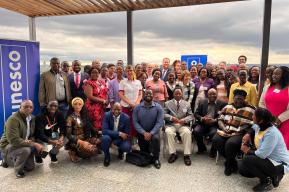News
Promoting Inclusive Technical and Vocational Education and Training (TVET) Policy in Indonesia

11 July 2019, Jakarta, Indonesia
How can Indonesia’s TVET system meet the needs of industry and ensure students from all social groups have equal access to quality education? This is the key question addressed by the participants of today’s workshop, organized jointly by UNESCO and Lembaga Demografi Universitas Indonesia (Institute of Demography of University of Indonesia. The workshop kicks off the project designed by UNESCO to assess the national TVET policy from the angle of social inclusion, to identify barriers that may preclude certain groups from accessing TVET, and to work with policymakers to remove these barriers. This project directly contributes to the national efforts towards the achievement of SDGs 4 (Quality Education); SDG 8 (Decent Work and Economic Growth); and SDG 16 (Peace, Justice and Strong Institutions).
Preparing the next generation for the future of work requires smart and inclusive planning. Technical and Vocational Education and Training (TVET) is an important investment in the skills needed for a new workforce. Indonesia’s efforts to transform towards knowledge-based economy call for a quality TVET system aligned with the market demand and leaving no one behind. According to the Indonesian government, the current TVET system faces a mismatch between the supply and demand of skills, and the relevance and applicability of practical skills taught in TVET institutions.
To contribute to the development of a TVET system in Indonesia that is in line with the human rights framework and meets the future labour market demands in the country, UNESCO is collaborating with Lembaga Demografi Universitas Indonesia, to carry out a project designed to conduct research and deliver capacity building on inclusive TVET. The inception workshop was an occasion to launch a research and analysis involving multiple national stakeholders repressing the government and the various civil society groups working towards social inclusion. The results dissemination workshop will conclude the project in September 2019. UNESCO will integrate the results of the analytical work in the Inclusive Policy Lab, as well as the online platform linking SDGs and Human Rights in Indonesia.
For more information, contact Social and Human Sciences Programme Specialist Mr. Irakli Khodeli (i.khodeli@unesco.org).









